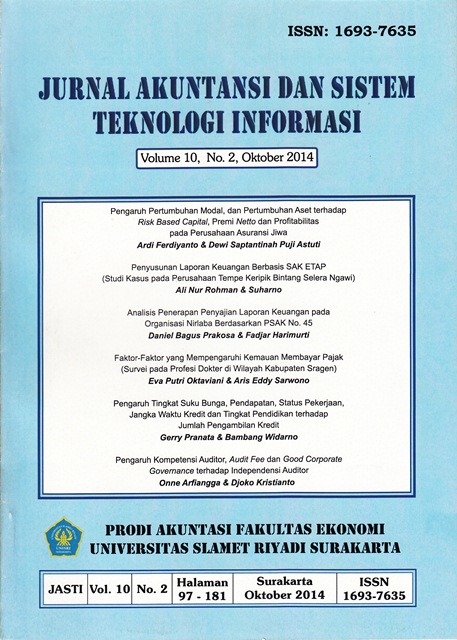PENYUSUNAN LAPORAN KEUANGAN BERBASIS SAK ETAP (Studi Kasus pada Perusahaan Tempe Keripik Bintang Selera Ngawi)
Abstract
The system is essential in business activity, especially businesses that have complex transactions. Regardless of the increasing complexity of business activities and transactions are also diverse, it is necessary to the management of operational activities that can be controlled properly. The results of the accounting system is a form of information that can be used to determine the company's financial condition and automatically establish the internal control system (SPI) which serves as a control to monitor the course of a system that has been running the company as well as to ensure that the operational activities are effective. This study uses a case study conducted on the owners and employees of companies tempe chips "Bintang Selera" Ngawi. The data required is a general overview of the company tempe chips "Tastes Star", respondents about the recording of transactions, internal control, and human resources. Data collection techniques with interviews and observations. Data were analyzed using qualitative descriptive analysis techniques, primary data in the form of transaction data companies and a number of questions on the owner of the company. The result showed that the preparation of the financial statements contained in the company is not appropriate, so the format that will be proposed and implemented to be able to meet the reporting needs of the company to scale enterprise including the SME category. Keywords: Accounting Information Systems, Internal Control.Downloads
Published
2015-09-28
Issue
Section
Artikel
License
Authors who publish this journal agree to the following terms:
- Authors retain copyright and grant the journal right of first publication with the work simultaneously licensed under a Creative Commons Attribution License that allows others to share the work with an acknowledgement of the work's authorship and initial publication in this journal.
- Authors can separately make additional contractual arrangements for non-exclusive distribution published by the journal (e.g., publish it in a book), with an acknowledgement of its initial publication in this journal.
- Authors are allowed and encouraged to send their work via online (e.g., in the institutional repositories or their website) after published by the journal.










